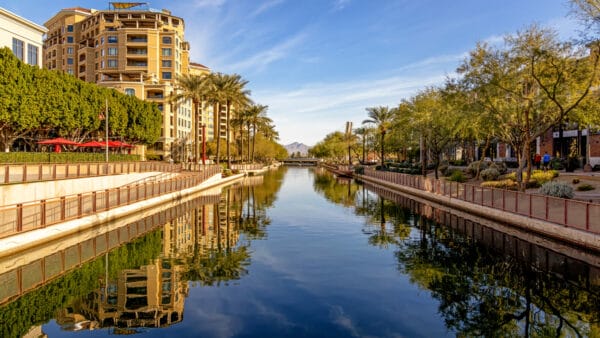Cody Marmon
Cronkite News
The seismic shift in Arizona’s gambling landscape occurred swiftly, and its impact continues to reverberate.
Arizona has surpassed $11 billion in total wagers placed since the inception of sports betting in 2021, with over $3.2 billion wagered throughout the first six months of 2023, according to an August Arizona Department of Gaming report.
Saturday’s two-year anniversary of the day event wagering went live provides another significant marker on the timeline of sports gambling’s growth. This boom has manifested through various channels, from the proliferation of sports betting apps to the establishment of on-site sportsbooks. Coupled with an uptick in marketing campaigns, the fervor for sports gambling in Arizona appears unstoppable. The state’s evolution into a gambling hub is a story of transformation and opportunity, but it also raises critical questions about responsibility and addiction.
“Arizona’s number has been significant for the size of the state,” said Pat Evans, a writer who covers the legal online sports wagering industry for Legal Sports Report. “It’s a great sports atmosphere, and Phoenix has every professional sport, including hosting the PGA and NASCAR. Arizona was one of the first states to anticipate the launch and had enough time to watch the sports gambling industry grow.”
Arizona’s evolution as a gambling hub
Seventeen active mobile sports betting operators are licensed by the Arizona Department of Gaming.
“It’s obviously a tremendous change,” said Kyle Odegard, the sports gambling editor for Compare.bet. “The last couple of years, it’s been a complete 180 where all these sponsorships exist within the NFL and NBA. I think it’s good because if you add more money, you have more jobs, and the more resources you can put into it, the more it can benefit people from the industry.”
In September 2022, FanDuel opened an in-person sportsbook at Footprint Center, while Caesars Sportsbook opened at Chase Field simultaneously. The Arizona Cardinals opened the NFL’s first on-site sportsbook ahead of their 2022 season opener against the Kansas City Chiefs. The on-site locations “provide customers a touch point,” Evans said. “Some people are more willing to deal with cash instead of navigating an app.”
In June, according to the Arizona Sports Betting Revenue release, $2.3 million in retail wagers were placed at Arizona’s three sportsbooks.
“Retail establishments only make up about 10 percent of actual betting in a state. It’s online that is the bulk of the betting,” said Bill Bradley, the former editorial lead writer for Action Network. “Now that everything is available on your app, they’re opening the retail sportsbook online to reach a wider audience. Sportbookies just want to get a feel for what people are doing and what the market is like.”
A competitive market like Phoenix has added more economic benefits to the state through sports betting and perhaps contributes to its hosting premier sporting events like the Super Bowl 57 and the 2024 Men’s Final Four. It is possible sports betting will play a decisive role in selecting future host cities, and the state’s argument will be even stronger after the DraftKings Sportsbook at TPC Scottsdale opens in October.
Balancing opportunity and responsibility
Amid the sustained rise in sports gambling in the Valley, there has been more marketing online alongside billboards promoting sports gambling downtown. In order to attract new sports gamblers, large marketing campaigns utilize “risk-free” offers and celebrities for advertisement. There is no escaping Jamie Foxx or the Manning family commercials for BetMGM and Caesars.
However, it is a dangerous proposition for these celebrities to endorse.
“If you endorse a product, this is a behavior that is an addictive disorder,” Kraus said. “You have to be really careful, and I will say right now, we’re so caught up in the money, we’re not thoughtful.”
The American Psychiatric Association’s Diagnostic Statistical Manual lists gambling disorders as “to gamble with increased amounts of money, and to repeat unsuccessful attempts to achieve the desired excitement.”
The normalization of sports gambling behaviors often leads to gambling addiction because it increases the risk of people ignoring the risks and amplifying the potential for addictive behavior.
Tori Horn, who works as a clinical behavioral addictions specialist at the University of Memphis, has dealt with gambling addicts since 2019, and her main objective has always been to provide family members with the best strategies for their loved ones.
“You don’t want to force treatment on someone because that will push them away,” Horn said. “The treatment should be the gambler’s idea.”
The Arizona Department of Gaming has an anonymous self-screening quiz under the resources tab of its website that may be consulted for a personal assessment.
“It really can be a personal decision. And we understand that,” Mikkelson said. “We want to make sure that people can remain anonymous, do that at their own discretion, and seek out the help they need. And we want people to know that those resources are available. We do fund those treatment services and offer education and presentations.”
Arizona’s gambling resources will continue to play a crucial role in providing support for those who are vulnerable to gambling. To engage in sports and entertainment, there is a fine line to be walked.
“I think that parents need to be very aware of what’s out there and how accessible they can be to children,” said Arizona Division of Problem Gambling Director Elise Mikkelson. “We always want to ensure that kids don’t have access to some of these available modalities.”
The Arizona Department of Gaming offers various treatments, accessible for both the gambler and their family, referred to as state-funded treatment.
“Typically, it runs at least a million, if not more than … $1 million a year, that we reimburse our treatment providers for,” Mikkelson said. “That’s treating both problem gamblers and what we call ‘persons affected’ by problem gambling, including spouses, family members and co-workers can also seek treatment services.”
Arizona’s average age of those who contacted a state helpline number has decreased since September 2021, when sports betting was legalized in Arizona.
“Nationwide, the trend is being reported that we are seeing younger people seeking services and assistance for help,” Mikkelsen said.
Mikkelsen deals with this at the heart of facilitating gambling resources and treatment centers throughout the Arizona Department of Gaming, which regulates casinos and event wagering.
The Arizona Council of Compulsive Gambling and the Arizona Department of Gaming are two of the best resources for gamblers who seek help.
“We assist in mitigating any fallout,” Mikkelsen said. “Our treatment area includes 16 entities, including state counselors and agencies, prevention, outreach area, self-exclusion and education facilities. We work to ensure that if somebody is having issues related to their gambling, we have resources in place to get the help they need.”
Pam Koopman, a director on the board of the Arizona Council on Compulsive Gambling, stated that the majority of calls she receives on the 24-hour helpline are from younger male gamblers or the families of younger male gamblers.
“Some start as gamers; the short road between passive gaming and active sports gambling,” Koopman said.
Still, it remains a satisfying hobby for many. How fans perceive sports in today’s age of legalized sports gambling intertwines when the outcome of a game becomes secondary to the outcome of the bet.
And as gambling becomes even more mainstream in Arizona and throughout the country, revenue numbers prove the industry’s rapid growth in interest while the effort to provide more access to resources tries to keep pace.








